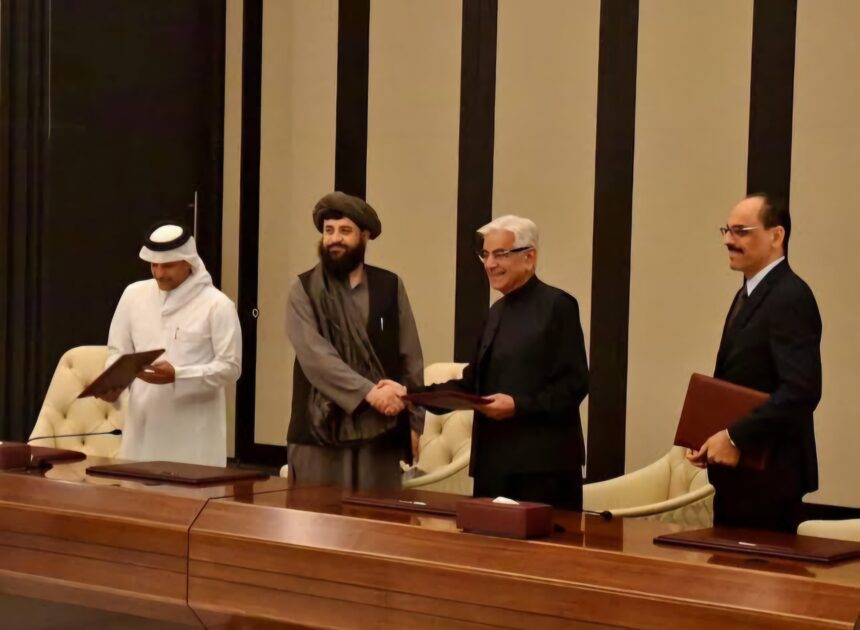RASC News Agency: Reliable diplomatic sources have confirmed that the latest round of negotiations between Taliban representatives and Pakistani officials in Istanbul has ended in total failure, with both sides leaving the table without reaching any form of agreement.
According to Pakistan’s Geo News, citing informed sources late Sunday evening October 26, the discussions collapsed after Islamabad presented its final position to the Taliban delegation. The Pakistani side reportedly demanded concrete and measurable actions against terrorist networks operating from within Afghanistan’s borders.
Sources close to the talks revealed that Islamabad emphasized there could be “no compromise or retreat” in the fight against terrorism, and that the Taliban must fundamentally revise their policies and behavior toward militant organizations using Afghanistan as a base of operations.
Security officials familiar with the matter described the Taliban’s arguments as “devoid of logic and disconnected from reality,” noting that their responses indicated a hidden agenda misaligned with the stability of Afghanistan, Pakistan, and the broader region.
Islamabad, while maintaining diplomatic restraint, warned that the continuation of talks depends entirely on the Taliban’s willingness to alter their conduct and engage in genuine counterterrorism cooperation. Turkish officials, acting as informal mediators, reportedly urged the Taliban to face the realities on the ground and to take tangible steps toward resolving the crisis.
So far, the Taliban have not issued any formal statement in response to these reports.
The two-day talks, held in Istanbul, lasted nearly 30 hours in total, according to Pakistani media. This round followed earlier discussions in Doha, mediated by Qatar and Turkey, which had temporarily resulted in a short-lived ceasefire between the two sides.
However, relations between Islamabad and the Taliban regime have sharply deteriorated in recent weeks. The escalation has led to the closure of several major border crossings including Chaman, Khyber, South and North Waziristan, and Kurram paralyzing cross-border trade. Hundreds of freight trucks are reportedly stranded at key checkpoints such as Torkham, Bab-e-Dosti, Kharlachi, Angoor Adda, and Ghulam Khan, inflicting further economic damage on both sides.
Pakistani officials, expressing visible frustration, told RASC News Agency that Islamabad has shown “remarkable patience and seriousness” throughout the Istanbul negotiations. The next move, they said, “rests entirely with the Taliban,” who must decide whether to cooperate on security matters or risk complete diplomatic isolation.
Experts believe that Pakistan’s core demand the severance of all ties between the Afghanistani Taliban and the Tehrik-i-Taliban Pakistan (TTP), alongside the expulsion of TTP fighters from Afghanistan remains highly unrealistic. The two groups share deep ideological, historical, and operational linkages that have evolved over decades of mutual cooperation.
Both movements originate from the same radical Deobandi school of thought and have long collaborated in armed campaigns against regional governments. Analysts note that many local Taliban commanders along Afghanistan’s eastern and southern borders maintain close ethnic, ideological, and even familial ties with TTP fighters.
Even if the Taliban leadership were to accept Pakistan’s conditions, they are widely seen as incapable of enforcing them on the ground. A significant portion of the Taliban’s rank-and-file fighters remain sympathetic to, or directly allied with, TTP militants. Any attempt by the Taliban to forcibly expel TTP members could trigger internal rebellion, leading to factional splits or even the collapse of Taliban control in strategic border provinces.
Security analysts warn that if the Taliban were to publicly order the expulsion of TTP forces, they could face mass defections and internal resistance from within their own movement. Some fear that border provinces might fall under the control of TTP-aligned factions, further destabilizing Afghanistan’s already fragile security landscape.
In this context, the Taliban find themselves trapped in an increasingly untenable position. On one hand, defying Pakistan’s demands risks a full-blown military confrontation with a powerful neighbor. On the other hand, complying with Islamabad’s terms could ignite internal chaos and erode the regime’s already fragile cohesion.
Regional observers argue that the Taliban’s refusal to distance themselves from transnational militant groups exposes their chronic inability to function as a responsible governing authority. Instead of building a stable and inclusive state, the Taliban continue to shelter extremist networks whose operations threaten the security of both Afghanistan and the wider region.
As one Kabul-based political analyst told RASC News Agency, “The Taliban have trapped themselves between ideology and survival. Their dependence on militant factions has become both their strength and their fatal weakness.”
Ultimately, the failure of the Istanbul talks underscores a growing reality: the Taliban’s promises of moderation and regional cooperation are rapidly losing credibility. The group’s isolation is deepening, its internal divisions are widening, and its capacity to act as a legitimate governing entity is being further questioned by regional powers.
The future of Taliban–Pakistan relations now hangs in uncertainty and with it, the fragile stability of an entire region once again caught in the crossfire of militancy and mistrust.






